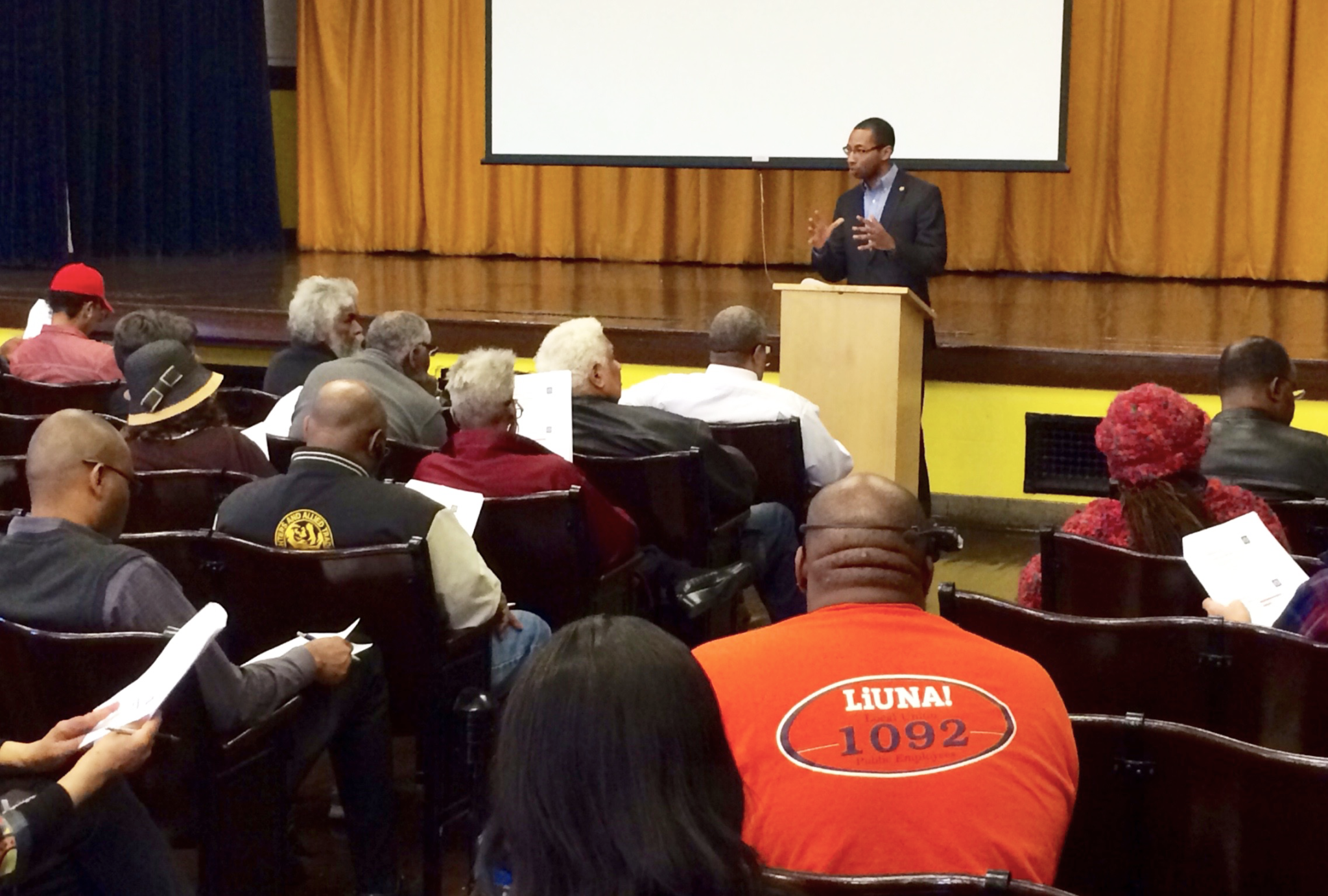State Representative Christian Mitchell hardly minces words when talking about Governor Bruce Rauner’s new budget. At a town hall meeting about the budget on April 27, Mitchell, whose 26th District runs from South Shore to the Near North Side, said that Rauner’s appeal to shared sacrifice was “bogus,” especially in light of his unwillingness to raise taxes on corporations or the wealthiest members of society. He also tore into Rauner’s claim to be a very pro-African-American governor. “I don’t know if the word ‘pro’ means what you think it means,” Mitchell said.
It was hardly surprising, then, that much of the town hall meeting, which took place in the auditorium of Bouchet Math and Science Academy in South Shore, was devoted to ripping into the (to use Mitchell’s word) “draconian” budget proposal. Mitchell began by explaining how in March, Rauner passed an emergency measure that cut state spending for fiscal year 2015, which ends June 30 of this year, by 2.25 percent. In essence, this meant that a years’ worth of cuts were squeezed into just three months. These included cuts to both education and social services, including $150 million from the General State Aid that goes to Illinois public schools, money that is distributed on the basis of property wealth within each school district. Mitchell emphasized that schools in cities like Chicago and East St. Louis are already being hit the hardest by budget cuts.
The outlook hardly got brighter when Mitchell moved on to examining the proposed budget for 2016. The budget cuts $1.5 billion from Medicaid—Mitchell pointed out that Medicaid paid for more than fifty percent of births in the state—while the Department of Children and Family Services (DCFS), together with DCFS services for youth aged eighteen to twenty-one, would have more than $300 million cut from its budget. In the education sector, $387 million would be cut from higher education, including scholarships and grants, while CPS would lose $16 million. A number of social service organizations, such as Teen Reach, an afterschool program, would see funding eliminated entirely. Teen Reach is now ending its Chicago-area program, which included such services as tutoring and substance abuse education, and served about seventy-five children.
Mitchell also lambasted Rauner on his stance toward unions, pointing out that his proposed creation of right-to-work zones, in which employees can opt out of unions, would create lower wages for workers and negatively affect small businesses. Instead, Mitchell opined, larger corporations stand to benefit, especially with the additional help of $100 million in corporate tax breaks.
Throughout his presentation, Mitchell interspersed personal anecdotes designed to show how he and his family benefited from many of the programs being downsized or eliminated. To that end, he recounted how his grandfather had kept him out of trouble as a youth by taking him to boxing, as part of an outreach program that would no longer exist under the new budget, and said that decreased access to mammograms and screenings for women could have been disastrous for his mother, whose breast cancer was caught early enough to be properly treated.
After Mitchell spoke, there was a question-and-answer session. One resident asked why Speaker of the Illinois House of Representatives Michael Madigan couldn’t be more assertive in calling for taxes to be raised on the wealthiest cohorts. Mitchell’s response was that Illinois has a constitutional amendment barring a graduated income tax, and that in fact, the taxation scheme often works such that working people pay a higher share of their income than the top one percent.
Mitchell also pointed to several alternate proposals he had crafted or supported in place of cuts in order to cover the state’s deficit (two to six billion dollars, “depending who you talk to”), including a financial services tax that would levy a three-percent surcharge on services used by high-worth individuals, such as private equity funds, or a tax on financial transactions that, besides raising revenue, would hopefully make financiers slightly more risk averse.
Of course, it is unlikely that Rauner would accept these sorts of proposals. That is why Mitchell’s town hall meeting was not meant simply to inform residents and answer their concerns; it was also an attempt to encourage locals to appeal more strongly to their politicians. After Mitchell’s presentation, he invited up Reverend Booker Vance, who spoke briefly about the Clean Jobs Initiative, a proposal designed to create about 32,000 jobs a year and improve energy efficiency by shifting the state’s energy consumption toward renewable energy sources. Much of his presentation, however, attempted to impress upon residents the importance of organizing in order to have their views heard. “We need to go downtown with an agenda,” he said, emphasizing how useful it is to have strong, specific goals when speaking with one’s representatives.
Still, Mitchell seemed hopeful, if somewhat cautious, about the chances that the effects of the proposed budget could be mitigated. In response to one resident expressing disappointment at the atmosphere of spinelessness surrounding House Democrats, he responded, “I can’t defend the lack of political will in the House. I do think that this budget proposal, though, it’s waking some people up.”
Correction: An earlier version of this story stated that the Reverend that spoke was Corey Brooks. His name is Booker Vance.

